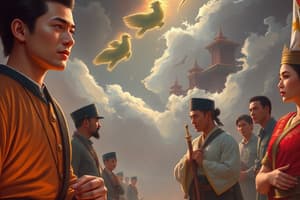Podcast
Questions and Answers
The opening of the Philippine ______ Trade marked a significant event in history.
The opening of the Philippine ______ Trade marked a significant event in history.
World
Carlos Maria Dela Torre taught the Filipino people about ______.
Carlos Maria Dela Torre taught the Filipino people about ______.
Liberalism
General Rafael de Izquierdo opposed the liberal methods of Carlos Maria Dela Torre, favoring ______.
General Rafael de Izquierdo opposed the liberal methods of Carlos Maria Dela Torre, favoring ______.
Conservatism
The Cavite ______ was a crucial moment that sparked Filipino nationalism.
The Cavite ______ was a crucial moment that sparked Filipino nationalism.
GOMBURZA refers to three Filipino priests who fought for ______ rights.
GOMBURZA refers to three Filipino priests who fought for ______ rights.
The forced labor system was known as ______ y Servicios.
The forced labor system was known as ______ y Servicios.
The ______ system allowed Spanish settlers to extract forced labor from indigenous workers.
The ______ system allowed Spanish settlers to extract forced labor from indigenous workers.
Republic Act 1425, also known as the ______ Law, mandates courses on the life and works of José Rizal.
Republic Act 1425, also known as the ______ Law, mandates courses on the life and works of José Rizal.
To pay tribute to our national ______ for devoting his life and works in shaping the Filipino character.
To pay tribute to our national ______ for devoting his life and works in shaping the Filipino character.
The ______ leads the province.
The ______ leads the province.
Full-blooded Spaniards born in Spain are referred to as ______.
Full-blooded Spaniards born in Spain are referred to as ______.
The ______ provides advice and is responsible for advising the Governor General.
The ______ provides advice and is responsible for advising the Governor General.
The political and moral philosophy based on individual rights and liberty is known as ______.
The political and moral philosophy based on individual rights and liberty is known as ______.
The historical period of Spanish colonization in the Philippines lasted from ______ to 1898.
The historical period of Spanish colonization in the Philippines lasted from ______ to 1898.
The Alcalde mayor is also referred to as an ______.
The Alcalde mayor is also referred to as an ______.
The practice of social stratification ranks individuals based on power, ______, and wealth.
The practice of social stratification ranks individuals based on power, ______, and wealth.
Flashcards are hidden until you start studying
Study Notes
Economic and Political Factors in Philippine History
- Philippine World Trade opened, impacting economic dynamics.
- Introduction of liberal ideas prompted political transformation.
Carlos Maria Dela Torre
- Influential in spreading liberalism among Filipinos, promoting reforms.
General Rafael de Izquierdo
- Championed conservatism, opposing Dela Torre's liberal methods.
Cavite Mutiny
- Catalyzed Filipino nationalism, leading to the Philippine Revolution against Spanish rule.
- Known locally as “panghihimagsik,” it symbolized resistance and desire for autonomy.
GOMBURZA
- Referral to three Filipino priests: Mariano Gomez, Jose Burgos, and Jacinto Zamora.
- Advocated for equal rights for Filipino priests, leading to their martyrdom.
- Executed by garrote in Bagumbayan (now Luneta Park) in 1872 for alleged subversion.
- Jose Burgos was honored by José Rizal, who dedicated "El Filibusterismo" to him.
Unjust Policies
- Polo y Servicio: Mandatory labor system requiring men aged 16-60 to work ten days a year for the government.
- Encomienda System: Spanish settlers granted rights to extract labor from indigenous populations.
- Haciendas: Largest landowners were Spanish friars, controlling vast agricultural lands.
- Bandala: Forced sale of products at very low prices to the Spanish government.
- Tributo: Tax obligation paid in cash or kind by Filipinos.
Republic Act 1425 (Rizal Law)
- Mandated inclusion of Jose Rizal's life and works in educational curricula.
- Aimed to inspire nationalism and honor Rizal's contributions to Filipino identity.
Political Structure under Spanish Rule
- Alcalde Mayor: Leader of the province, represented the Governor-General.
- Gobernadorcillo: Managed town governance.
- Cabeza de Barangay: Tax collector without compensation.
- Social Stratification:
- Peninsulares: Spaniards born in Spain, holding top status.
- Insulares: Spaniards born in the Philippines.
- Criollos: Mixed Spanish and Filipino descent.
- Ilustrados: Educated Filipinos.
- Indios: Indigenous people, often subjected to slavery.
Governance and Administration
- Central government established by Spain, with the Governor-General holding significant authority.
- Visitador: Appointed to oversee Spanish colonial activities in the Philippines.
- Residencia: Judicial court assessing the performance of the Governor-General.
- Royal Audiencia: Advisory body to the Governor-General.
Historical Context
- Spanish colonization spanned from 1565 to 1898, deeply affecting socio-political structures.
- Notable revolutions in the 19th century included the Industrial, French, and American revolutions, influencing liberal thought in colonial territories.
Philosophical Paradigms
- Liberalism: Espouses individual rights, political equality, and liberty.
- Conservatism: Seeks to preserve traditional institutions and values.
Justice System and Maladministration
- Inequities in the justice system favor the wealthy, reflecting broader socio-economic disparities.
- Penal codes often inaccessible to the marginalized population.
Studying That Suits You
Use AI to generate personalized quizzes and flashcards to suit your learning preferences.




